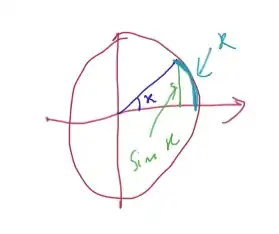As the title says.. it says to use the mean value theorem but I don't see how that's applicable.
Thank you
As the title says.. it says to use the mean value theorem but I don't see how that's applicable.
Thank you
I just propose a geometric proof:

Hint:
$$f(x):=\sin x-x\implies f'(x)=\cos x-1\le 0$$
so $\;f\;$ is monotone descending, so
$$f(x)\le f(0)$$
At $x=0$, $f(x)=x- \sin(x)$ evaluates to $0$.
Try to do a proof by contradiction.
So lets suppose there was some point $c>0$ so that $f(c) < 0$. Apply Mean Value Theorem to the interval $[0,c]$ and conclude that the there exists some $a \in [0,c]$ so that $f'(a)<0$.
But now compute $f'(x)$ as a function. You will see that it must always be positive. Hence, this contradicts that $f'(a)>0$ so there does not exist such a $c$ above. Thus we have the desired equality.